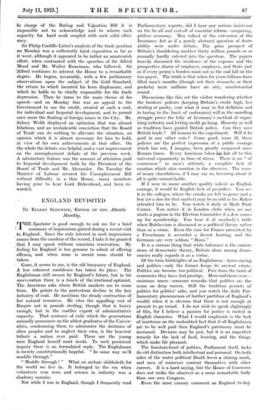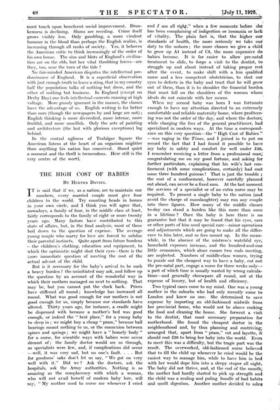ENGLAND REVISITED
By ELLERY SEDGWICK, EDITOR OF THE Atlantic Monthly.
THE Spectator is good enough to ask me for a brief summary of impressions gained during a recent visit to England. Since the only interest in such impressions comes from the candour of the record, I take it for granted that I may speak without conscious reservation. My feeling for England is too genuine to admit of offering offence, and when none is meant none should be taken.
Gone, it seems to me, is the old buoyancy of England. A less coherent confidence has taken its place. The Englishman still swears by England's future, but in his asseveration there is a touch of the irrational optimist. The American asks where British markets are to come from. He points to the portentous decline in the key industry of coal. He mentions the steady contraction of her natural resources. He cites the appalling cost of Empire not in pounds sterling, though that is heavy enough, but in the costlier export of administrative capacity. That sentence of exile which the generations annually pronounce on the ablest graduates of the Univer- sities, condemning them to administer the destinies of alien peoples and to neglect their own, is the heaviest tribute a nation ever paid. These are the young men England herself most needs. To such persistent inquiry there is no formulated reply. The Englishman is merely constitutionally hopeful. " In some way we'll muddle through."
" Muddle through ! " What an archaic shibboleth for the world we live in. It belonged to the era when volunteers won wars and science in industry was a shadowy surmise.
Not while I was in England, though I frequently read Parliamentary reports, did I hear any serious insistence on the be-all and end-all of essential reform—unsparing, pitiless economy. Men talked of the extension of the Insurance Act as if a purely abstract question of desir- ability were under debate. The grim prospect of Britain's shouldering another thirty million pounds or so annually hardly entered into the question. The papers heavily discussed the incidence of the expense and the prospective shares of employer, employee, and State just as if every penny's burden must not in the end fall on the tax-payer. The truth is that when for years billions have filled men's mouths (though not their stomachs or their pockets) mere millions have an airy, unsubstantial sound.
Discussions like this set the visitor wondering whether the bankers' policies (keeping Britain's credit high, her sterling at parity, cost what it may in flat deflation and in taxing to the limit of endurance) will in the unrolling struggle prove the folly of Germany's method of organ- izing industry and letting credit go hang. Honesty as well as tradition have guided British policy. Can they save British trade ? All honour to the experiment. Will it be paid in any other coin ? Come good, come ill, these policies are the perfect expression of a public courage which has not, I imagine, been greatly surpassed since Roman times. Every American takes his hat off to this universal equanimity in time of stress. There is an " of courseness " in men's attitude, a complete lack of emotion which stirs emotion in the observer. The sense of weary cheerfulness, if I may say so, hovering about it all is quite unmatchable.
If I were to name another quality salient as English courage, it would be English lack of prejudice. You see it in the colleges, where the cranks are left in peace and a boy (or a don for that matter) may be as odd as his Maker intended him to be. You watch it daily at Hyde Park Corner. You notice it in London clubs when no one starts a pogrom in the Election Committee if a Jew comes up for membership. You hear it at anybody's table when Bolshevism is discussed as a political theory rather than as a crime. Even the case for France presented by a Frenchman is accorded a decent hearing, and the Germans are very seldom " Huns."
It is a curious thing that while tolerance is the corner- stone of democratic theory, Britain alone among demo- cracies really regards it as a virtue.
Of the twin birthrights of an Englishman—horse-racing and politics—only the former keeps its ancient estate.
Politics are become too political. Free from the taint of economics they have lost prestige. Here and there even-- °minions omen—someone remarks that politics are the scum on deep waters. Still the tradition persists of politics for politics' sake, and you watch the daily Par- liamentary phenomenon of further partition of England's wealth when it is obvious that there is not enough at present to go round. I do not wish to speak slightingly of this, for I believe a passion for justice is rooted in English character. What I would emphasize is the lack of insistence on the undoubted fact that if all Englishmen are to be well paid then England's patrimony must be increased. Division may be just, but it is an imperfect remedy for the lack of food, housing, and the things which make life pleasant.
The fountain-head of politics, Parliament itself, lacks its old distinction both intellectual and personal. On both sides of the water political Death loves a shining mark, and men of eminence content themselves with other careers. It is a hard saying, but the House of Commons does not strike the observer as a more remarkable body than our own Congress.
Even the most cursory comment on England to-day must touch upon beneficent social improvement. Drun- kenness is declining. Slums are receding. Crime itself grows visibly less. Only gambling, a more virulent 'humour in the blood than perhaps the English realize, is increasing through all ranks of society. Yes, it behoves the American critic to think increasingly of the order of his own house. The sins and blots of England's ,eiviliza- tion are on the ebb, but her vital throbbing forces—are they, too, near the turn of the tide ?
No fair-minded American disputes the intellectual pre- dominance of England. It is a superficial observation with just enough truth to leave a sting, that in my country half the population talks of nothing but- dress, and the other of nothing but business. In England (except on Derby Day) one feels intellectual currents running at high voltage. More grossly ignorant in the masses, the classes have the advantage of us. English writing is far better than ours (though the newspapers by and large are not) ; English thinking is more diversified, more intense, more fruitful, and more unselfish. Only the arts of painting and architecture (the last with glorious exceptions) lag behind.
In the central ugliness of Trafalgar Square the American listens at the heart of an organism mightier than anything his nation has conceived. Stand quiet a moment and the thrill is tremendous. Here still is the very centre of the wox!.l.



























































 Previous page
Previous page